Is there way back for the beautiful and historic Hulme Hippodrome?
- Written by Thom Bamford
- Last updated 11 months ago
- Community, History, Trafford
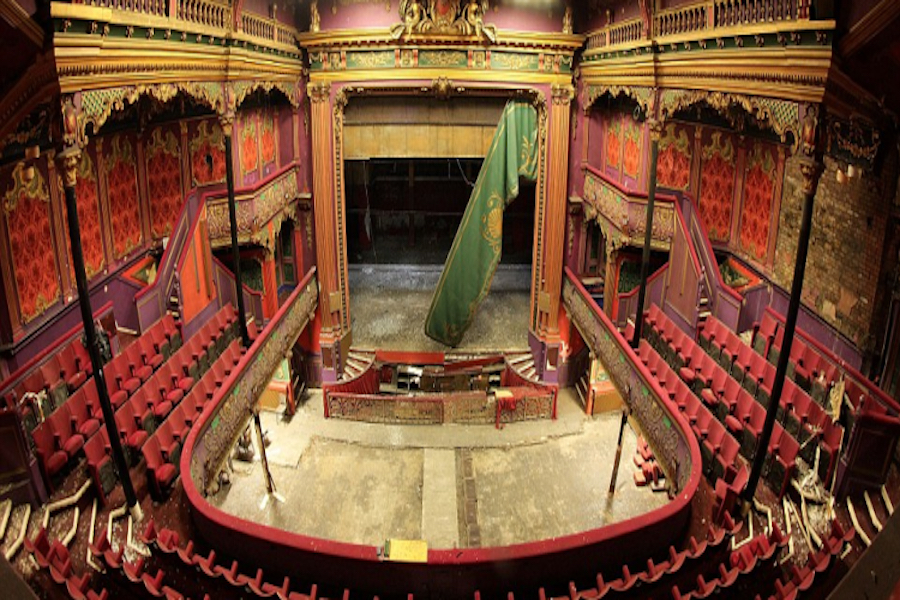
Originally constructed as a theatre and music hall, the Hulme Hippodrome has a rich history dating back to its opening in 1901.
A Grade 2 listed building, it holds national heritage significance as a working-class theatre that has been locally loved for generations.
The architect of the building was J. J. Alley, who put it together in a stunning Edwardian style.
It opened its doors on 7 October 1901 as a proscenium arch theatre with two galleries and a side hall, serving as a hub for various forms of entertainment.
The Hulme Hippodrome
Over the years, the Hulme Hippodrome has played a vital role in the country’s cultural history.
Notably, it holds importance for being the venue where Morecambe and Wise’s first series was broadcast, adding to its national cultural and heritage significance.
During the 1940s, the theatre operated as a repertory theatre, and in the early 1950s, the BBC utilised the space for over 20 different series, contributing to its rich broadcasting history.
Fondly referred to as “The Hipp” in local memoirs and records, the theatre’s stage doors can be found on Warwick Street.
Despite its illustrious past, the Hulme Hippodrome has been shuttered since 2018.
However, a passionate campaign group has emerged, driven by a mission to restore this historic gem and revitalise it as a community resource for the creative industries.
With the aim of preserving its architectural and cultural legacy, the group envisions the Hulme Hippodrome once again becoming a vibrant hub for artistic expression and community engagement.
We sat down with Tony Baldwinson, from Save Hulme Hippodrome LTD to talk about why they were trying to breathe some life into this once-epic venue.
He said: “We set up the group in 2021 to try and revive The Hulme Hippodrome to it’s incredible former glory.
“I guess there’s always that Manchester ethos, isn’t there? The drive to be the best and do things properly without messing up. In Manchester, there’s a sense of ‘not here, you don’t.’
“So, that’s what we’re all about.
“Our community group has a great skills mix, with members coming from various backgrounds.
“Yes, the historical significance of the place did draw me in a bit.
“It’s true that many old theatres can claim famous names due to bands and performers touring. What sets this venue apart is that it was the headquarters of a 17-week circuit known as the ‘Bread and Butter Tour.’
“This provided steady work for artists and performers in one area, offering some stability for working-class artists.
“Additionally, in the 1950s, the BBC faced a shortage of studio space and rented the Hippodrome for about five years, using it as a temporary outside broadcast studio on Sundays.
“So, six days a week, it functioned as a live venue, while on the seventh day, it became a BBC studio, often with a live audience in attendance.”
Through the dedicated efforts of the community group, there is hope that the Hulme Hippodrome will reclaim its position as a beloved and cherished landmark, serving the community and enriching the cultural landscape for generations to come.
The History of the Hulme Hippodrome
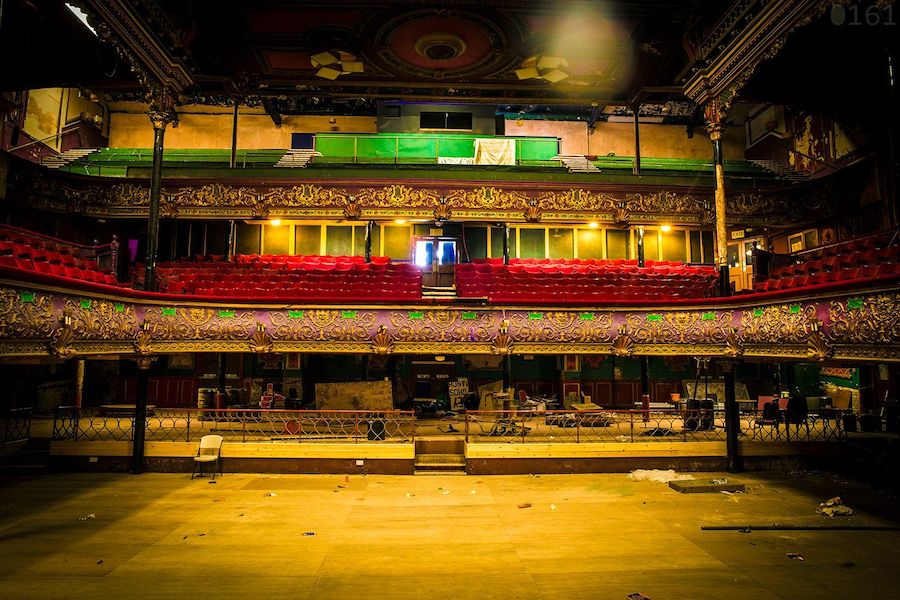
Throughout its existence, the Hulme Hippodrome has undergone various transformations and served different purposes.
Initially, it was a popular entertainment venue, hosting a wide range of performances, including music concerts, variety shows, and theatre productions.
So it has an incredible history of storied performers treading the tiles including Buddy Holly, Gene Vincent, and Eddie Cochran.
Tony continued: “Things are a bit different with a heritage building compared to a listed building because essentially it holds two values.
“Firstly, it has a commercial value, which is usually zero, as it wouldn’t be economically viable without grant income.
“However, it also possesses a heritage value, assuming that access to grants is possible, and thus, its worth would be determined in that context.
“We have an investor interested, but unfortunately, there’s not yet a willing seller. So, we have a willing buyer but lack a willing seller.”
The ‘Hipp’ during WWII
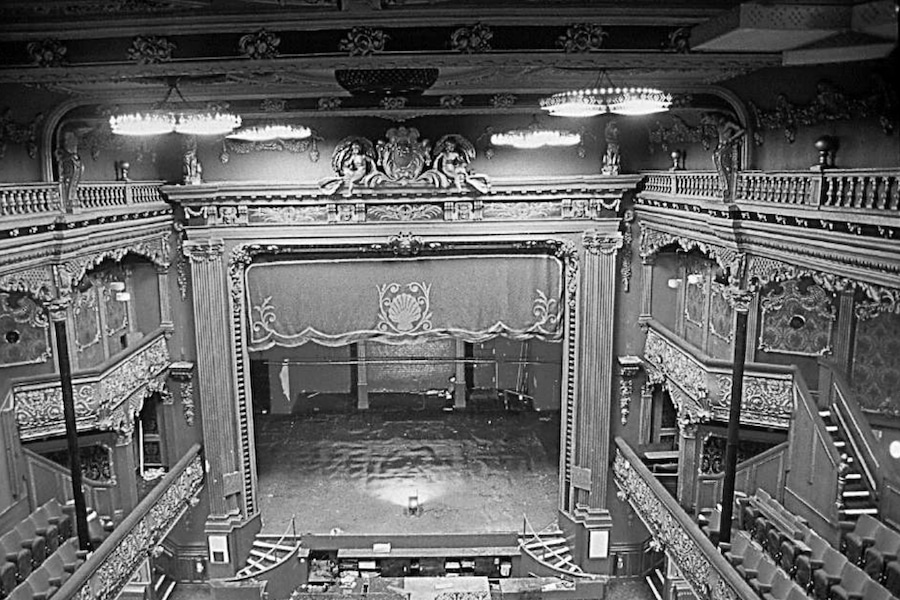
During World War II, the Hulme Hippodrome, or “The Hipp,” experienced a period of closure, most likely from around 1941.
However, it was reopened sometime between 1942 and 1949, and during this time, productions were staged by the Manchester Repertory Theatre.
Amid the challenges posed by the war, the theatre adapted its performance schedule.
Initially, performance times were staggered to accommodate wartime conditions. However, this arrangement was eventually replaced by the usual times of two nightly shows.
Despite the difficult circumstances, the theatre managed to maintain its tradition of staging the much-anticipated Fortescue pantomimes during Christmas and the subsequent month, typically featuring the normal repertory acting company.
In addition to the pantomimes, the theatre often featured a week of children’s plays adapted from children’s classics by a cast member, providing entertainment for young audiences.
As the war progressed and things settled down, the pantomimes evolved to include more variety-oriented performances.
The wartime period at the Hulme Hippodrome was not without its challenges.
With the ongoing threat of air raids, the Front of House personnel carried and wore tin helmets and gas masks for protection.
The St. John’s Ambulance Brigade attended every performance to ensure the safety of the audience.
In the event of an air raid, audiences were allowed to take shelter in the indicated street air raid shelter, although few often did, and performances continued amidst the sounds of bombing and anti-aircraft fire.
To protect the theatre from incendiary bombs, artists and Front of House staff were obliged to do fire-watching duty in the fire-watching towers built on the theatre’s rooftops.
Despite the difficulties, the theatre remained resilient and continued to offer entertainment to the public.
In the immediate post-war years, the Hulme Hippodrome functioned as a repertory theatre.
However, it eventually reverted to its roots, embracing variety and revue performances.
Tony continued, outlining the group’s plans for the building if they were to bring it back to life.
He said: “Often, these buildings face difficulties because the general market view is that there’s no practical use for them.
“However, we believe we have an outline business plan that demonstrates the viability of a 20-year rescue and repair and rejuvenation program.
“We refer to this approach as ‘loose fit, long life,’ meaning it can serve multiple purposes rather than being limited to just one, like a cafe bar or a wedding venue.
“It’s about being versatile while still respecting the building’s heritage and preserving its historical significance.
“For instance, if a dance group needs a rehearsal space or a samba club requires it, we’re open to accommodating various community activities. Additionally, we aim to support apprenticeships and early career development opportunities, leveraging the building’s large size for creative and educational purposes.
“The primary focus of our community group is to restore this historic venue to its former glory.
“While we won’t delve into the legal complications, we acknowledge its complicated modern history.”
Morecambe and Wise at the Hulme Hippodrome
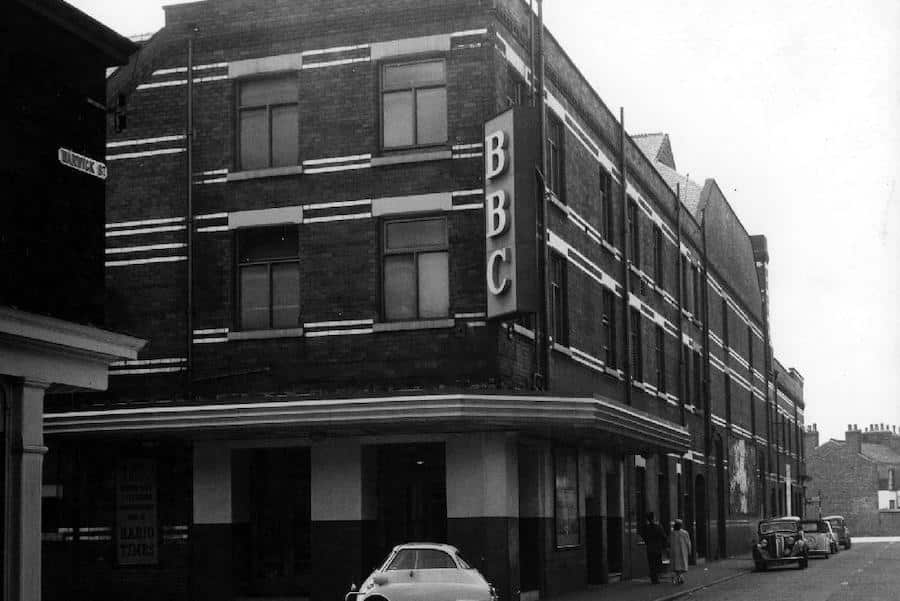
During their early career, the iconic comedy duo Morecambe and Wise gained prominence through a series of radio broadcasts on the BBC.
They contributed to 45 episodes of Variety Fanfare, which were broadcast from the Hulme Hippodrome, cementing their presence as talented contributors to the show.
As their popularity soared, Morecambe and Wise were soon given their own radio show at the Hulme Hippodrome, titled “You’re Only Young Once” (YOYO).
Originally planned for six episodes, the show aired from 9th November to 14th December 1953 on the Home Service’s North region.
Due to its success, the show was extended to a total of nine episodes, broadcast from 22nd December 1953 to 4th January 1954.
All episodes were produced by Ronnie Taylor and recorded at the Hulme Hippodrome, providing the perfect platform for the comedic brilliance of Morecambe and Wise to shine.
Tony said: “Morecambe and Wise had their first series together at the Hulme Hippodrome with a distinctive type of show called ‘Northern Variety,’ which stands out as a significant piece of social history here.
“While much of the BBC’s entertainment history revolves around London, there was an alternative circuit in the North, particularly in Manchester, before the days of studios on Oxford Road and later, Media City.
“The BBC had a small studio in Piccadilly Gardens but was running out of space, leading them to hire places like the Hulme Hippodrome.
“These lesser-known aspects, like the shows at Hulme Hippodrome, may not feature headline names like Frank Sinatra, but they contribute to the venue’s unique heritage, which is crucial for funding its repairs.”
Shirley Bassey at the Hippodrome
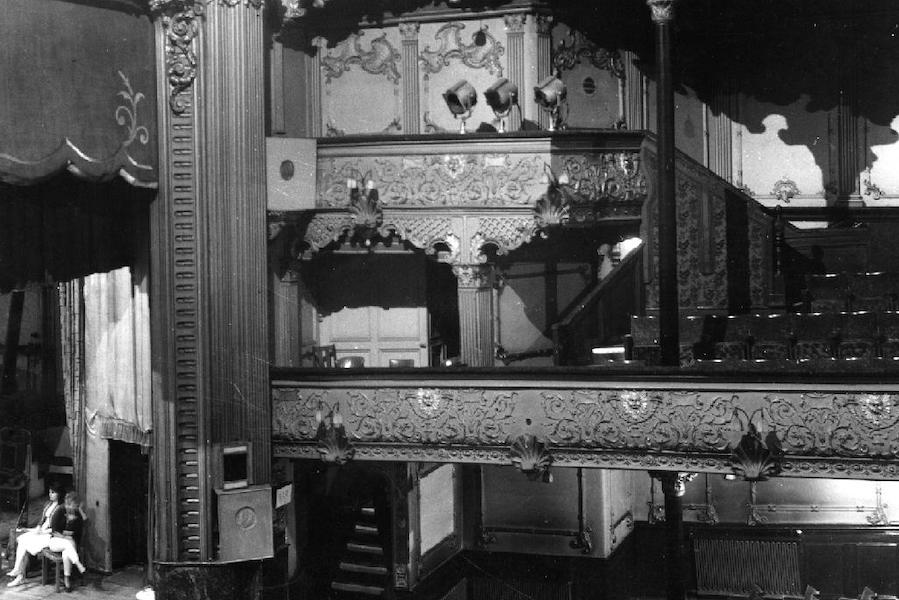
On the 17th of September 1953, a rising star named Shirley Bassey made her first-ever appearance as a singer in the touring production “Memories of Jolson” at the esteemed Hulme Hippodrome.
This marked the beginning of her professional touring career, and her exceptional talent was evident from the start.
In May 1954, Shirley returned to the Hulme Hippodrome, captivating the audience once again in the show “Harlem Jazz,” where her powerful performances of old and new blues tunes showcased her remarkable vocal abilities.
A Flexible future
Tony stressed the need to be flexible with the ‘new space’, should it come to fruition.
He said: “If you look at many venues now, or the smaller theatre in the Lowry, or Waterside’s Robert Holt Theatre in Salford, they all have movable seating, providing more flexibility for different events, such as cabaret-style shows, dance classes, and more.
“While preserving the building’s heritage, including its architectural features, other aspects like fixed seating on the ground floor can be changed and that’s acceptable.
“One of the challenges we are happy to discuss publicly is encouraging the current property developer and the willing buyer to negotiate a beneficial future for the property and the community.
“If the current developer were to see the logic in supporting the community’s efforts, we’d have no issue with that, which would simplify the process.
“As for the building’s style and era, it was built in 1901, making it late Victorian or early Edwardian.
“It’s not the typical grand venue like those in the West End of London but was a working-class theatre in the heart of Hulme, a densely populated area at the time.
“The venue had a seating capacity of 3000 people and had a very local and matter-of-fact appeal.
“The building’s listed status is mainly based on its decorative plasterwork, which is very ornate.
“While the listing protects seven specific features, it doesn’t mean the whole building can’t be touched.
“The conservation and architectural advisors will focus on preserving these features while allowing other improvements and additions that don’t negatively impact the building’s historic character.
“The idea is to work around the listed features while maintaining the building’s charm and essence.
“This might involve additions like signage, which generally wouldn’t impact the listed parts of the building.
“Overall, the goal is to strike a balance between preserving the heritage and creating a vibrant and flexible space for various community activities and performances.”
A way back for the Hulme Hippodrome?
The Friends of Hulme Hippodrome Facebook group, established in 2015, had an ambitious goal of securing the building’s listing in 2016 as an asset of community value (ACV).
Such a designation would have granted the community group a crucial six-month window to raise the necessary funds to purchase the building from the owner before it could be put on the open market.
Unfortunately, their application for ACV status was rejected by Manchester City Council.
A council spokesperson explained the decision, stating that while the Hulme Hippodrome was of significant historical value and held immense potential, bringing the building back into use would require substantial investment, estimated to be in the millions.
Without a concrete and viable business plan in place, it would be unfair for the council to assume that the community group could successfully turn the building around and maintain it effectively.
Despite this setback, the Friends of Hulme Hippodrome group continued their efforts to raise awareness and support for the preservation of this iconic building. The Save Hulme Hippodrome group have now followed on from when the Friends Group wound down.
Tony continued: “We have an angel investor who prefers to keep their name confidential, but they are known to the council and have a good track record.
“Despite having an investor ready to purchase the building, there will still be a need for funding in the 20-year programme to address various restoration and improvement projects.
“Heritage funding will be crucial, and though it could amount to up to £20 million, it won’t come as a single lump sum.
“We’ll work incrementally, using grants and income as they become available to plan the next steps.
“The community is indeed fully behind this project, evident from the 400 registered supporters we have, along with positive community engagement events.
“We often use the garden centre, which is conveniently located next door to the Hippodrome, as a venue for such events. They’ve been supportive of our work, making it a suitable, community-based choice.
“There’s significant goodwill and practical assistance from various quarters, including universities, professors, and students offering support. For instance, architecture students made a wooden scale model of the building, displayed recently at the Central Library.”
The group is dedicated to their vision of restoring the Hulme Hippodrome to its former glory, making it a vibrant community resource once again.
The group’s passion and commitment garnered admiration from the local community and preservation enthusiasts alike, even if the previous ACV application was not successful at that time.
Can the Hulme Hippodrome be saved?
The Hulme Hippodrome gained recognition for its historical and architectural significance, not least as a Grade II Listed Building and there have been efforts by local preservationists and community groups to protect and restore the building to its former glory.
However, the building’s future was uncertain, and there were discussions about various redevelopment plans for the site.
If you’d like to dive deep into the Hulme Hippodrome’s history, you can do so by clicking here
- This article was last updated 11 months ago.
- It was first published on 28 July 2023 and is subject to be updated from time to time. Please refresh or return to see the latest version.
Did we miss something? Let us know: press@ilovemanchester.com
Want to be the first to receive all the latest news stories, what’s on and events from the heart of Manchester? Sign up here.
Manchester is a successful city, but many people suffer. I Love Manchester helps raise awareness and funds to help improve the lives and prospects of people across Greater Manchester – and we can’t do it without your help. So please support us with what you can so we can continue to spread the love. Thank you in advance!
An email you’ll love. Subscribe to our newsletter to get the latest news stories delivered direct to your inbox.
Got a story worth sharing?
What’s the story? We are all ears when it comes to positive news and inspiring stories. You can send story ideas to press@ilovemanchester.com
While we can’t guarantee to publish everything, we will always consider any enquiry or idea that promotes:
- Independent new openings
- Human interest
- Not-for-profit organisations
- Community Interest Companies (CiCs) and projects
- Charities and charitable initiatives
- Affordability and offers saving people over 20%
For anything else, don’t hesitate to get in touch with us about advertorials (from £350+VAT) and advertising opportunities: advertise@ilovemanchester.com

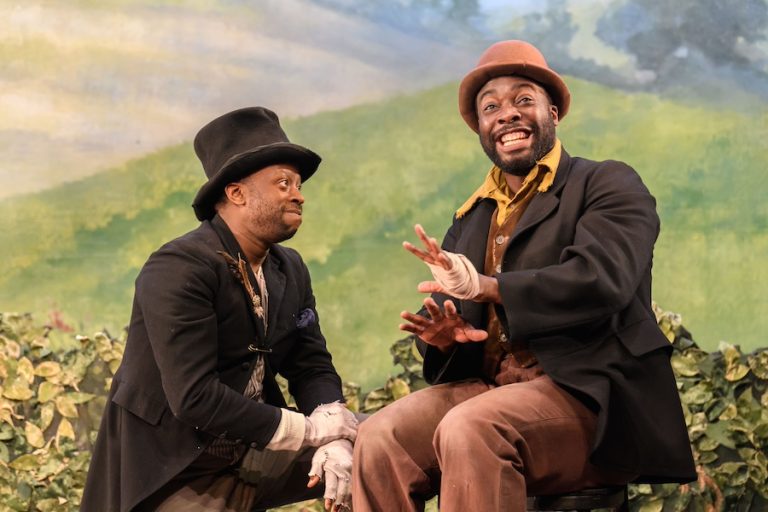
Review: Tambo & Bones at HOME is ‘ambitious, bold, gutsy…. and terrific’

Review: JB Shorts 26 at 53two is ‘a five-star showcase of northern talent’



















